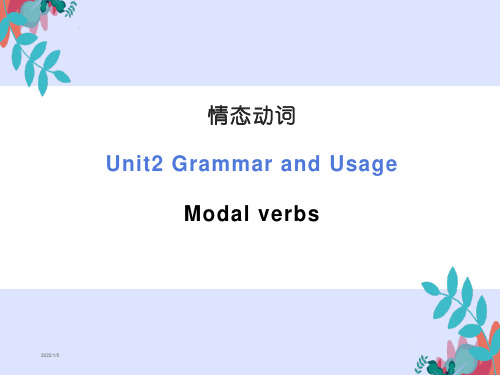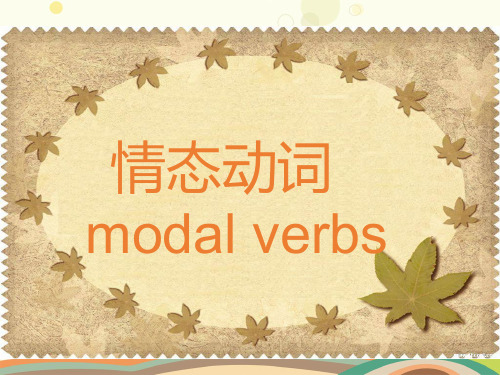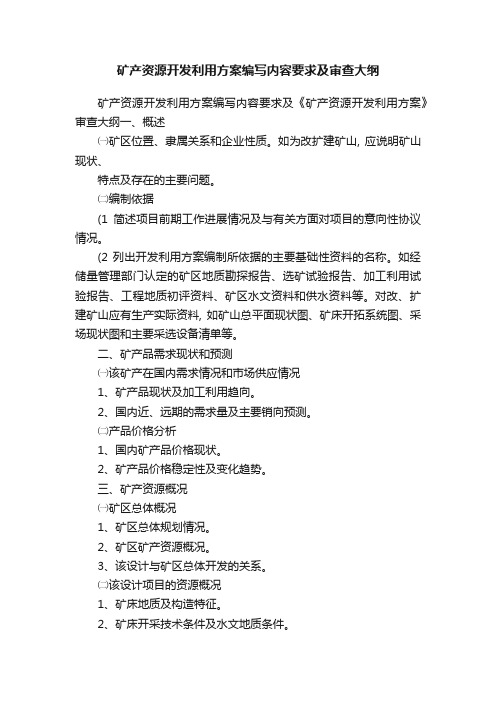最新情态动词公开课ppt
合集下载
情态动词讲解精ppt课件

例句
will/would
详细描述:will 表示现在的意愿或 预测,would 表示过去的或虚拟 的意愿或预测。
1. I will help you with your project.(我会帮助你完成你的项 目。)
总结词:表示意愿或预测
例句
2. They would have gone to the party if they had known about it earlier.(如果他们早点 知道,他们就会去参加聚会。)
表示意愿
情态动词+动词原形,如 would like to go,表示 某人想要去。
形式变化
基本形式
情态动词的基本形式包括 现在时、过去时和将来时 。
过去式
情态动词的过去式通常是 在基本形式后面加-d或ed,如could have done 、should have done等。
将来时
情态动词的将来时通常是 在基本形式后面加-will或shall,如will be able to 、shall have to等。
may与might的区别与联系
总结词
may表示现在的许可或可能性;might表示过去的可能性或许可。
详细描述
may用于肯定句中,表示许可或可能性,例如“You may use this room.”(你可以使用这个房间。 )“The book may be in the library.”(这本书可能在图书馆里。)might表示过去的可能性,常 用于过去时态的句子中,例如“He might come tomorrow.”(他明天可能来。)
未必、很难说
She might not agree with us.
表示虚拟语气
will/would
详细描述:will 表示现在的意愿或 预测,would 表示过去的或虚拟 的意愿或预测。
1. I will help you with your project.(我会帮助你完成你的项 目。)
总结词:表示意愿或预测
例句
2. They would have gone to the party if they had known about it earlier.(如果他们早点 知道,他们就会去参加聚会。)
表示意愿
情态动词+动词原形,如 would like to go,表示 某人想要去。
形式变化
基本形式
情态动词的基本形式包括 现在时、过去时和将来时 。
过去式
情态动词的过去式通常是 在基本形式后面加-d或ed,如could have done 、should have done等。
将来时
情态动词的将来时通常是 在基本形式后面加-will或shall,如will be able to 、shall have to等。
may与might的区别与联系
总结词
may表示现在的许可或可能性;might表示过去的可能性或许可。
详细描述
may用于肯定句中,表示许可或可能性,例如“You may use this room.”(你可以使用这个房间。 )“The book may be in the library.”(这本书可能在图书馆里。)might表示过去的可能性,常 用于过去时态的句子中,例如“He might come tomorrow.”(他明天可能来。)
未必、很难说
She might not agree with us.
表示虚拟语气
情态动词最新版课件

2. Obligation (义务)
3. Certainty (可能 性)
2022/1/8
二.We also use modal verbs to:
5. Make requests(提出请求) 6. Make suggestions(提出建
议) 7. Make offers(提供帮助) 8. Give advice(提出意见)
② 侧重于“克服一定困难”“经过一定努 力”“有能力”干某事
can ① 只有一般现在时和一般过去时 两种 时态 ② 客观上能够
2022/1/8
即讲即练
The fire spread through the hotel very quickly but everyone ____ get out.
A. had to
表示“请求”,口语中代替can,使语气更委婉,主要用
于疑问句,答语用can.----Could I use your bike
tomoryroouw? Yes,_____I_’__m.afNroa,id_n_o_t____________.
can
This can’t/couldn’t be done 表by示h不im相. 信的态度(主要
It will be sunny in the daytime, but it could rain later on this表e示ve“ni客ng观. 可能性”
-----Can I go now? -----Yes, y表ou示c“an请. 求和允许”
Could you wait a few days for the money?
can’t或couldn’t 表示“不可能”。 3.may和might表示现在或将来可能发生的
3. Certainty (可能 性)
2022/1/8
二.We also use modal verbs to:
5. Make requests(提出请求) 6. Make suggestions(提出建
议) 7. Make offers(提供帮助) 8. Give advice(提出意见)
② 侧重于“克服一定困难”“经过一定努 力”“有能力”干某事
can ① 只有一般现在时和一般过去时 两种 时态 ② 客观上能够
2022/1/8
即讲即练
The fire spread through the hotel very quickly but everyone ____ get out.
A. had to
表示“请求”,口语中代替can,使语气更委婉,主要用
于疑问句,答语用can.----Could I use your bike
tomoryroouw? Yes,_____I_’__m.afNroa,id_n_o_t____________.
can
This can’t/couldn’t be done 表by示h不im相. 信的态度(主要
It will be sunny in the daytime, but it could rain later on this表e示ve“ni客ng观. 可能性”
-----Can I go now? -----Yes, y表ou示c“an请. 求和允许”
Could you wait a few days for the money?
can’t或couldn’t 表示“不可能”。 3.may和might表示现在或将来可能发生的
我的公开课情态动词课件

2. —What’s the name of the book? —Khulaifi. _________ I spell it for you? A. Shall B. Would C. Can D. Might
情态动词表必要性
• must • need
高考真题演练
must 表“必须”
mustn’t 禁止
A. might B. must C. would D. can
3. What do you mean, there are only ten tickets? There ______ be twelve.
A. should B. would C. will D. shall
4. It is usually warm in my hometown in March, but it _____ be rather cold sometimes.
1. 不必须
don’t have to needn’t do
don’t need to
2. must还可表示“偏偏、偏要” e.g. Must you make so much noise?
• You ___ buy a gift, but you can if you want to.
• must
1. 常用于否定句或疑问句。 e.g. You can’t be hungry already — you had
lunch only two hours ago!
2. can用于肯定句中表示理论上的可能性,并不 牵涉是否真的会发生
e.g. You can hurt yourself if you play in the street.
A. must B. can C. should D. would
情态动词-完整版PPT课件

情态动词 modal verbs
1.情态动词的用法特点
1)情态动词 除 ought 和 have 外,后面只能 接不带to 的不定式。 2)情态动词没有人称,数的变化,即情态动 词第三人称单数不加-s。 3)情态动词没有非谓语形式,即没有不定式, 分词等形式。
can could may might shall should must will would ought to
have to dare need used to
表示推测
情态动词
不表示推测
2.表示推测——情态动词的重要用法.
情态动词
对将来
对现在
对过去
m肯ust/定sho的uld 推测
+ V. + V. + have done
常见must be + be doi定的推测 can’t, couldn’t
疑问的推测
can, could
+ V.
+ V.
+ have done
+ be doing
可以用not表示“可能不”
+V.
+ V.
+ have done
+ be doing
+ V.
+ V.
+ have done
+ be doing
不同的“肯定”程度可按下列层次排列: He is at home. (事实) He must be at home.(非常肯定的推断) He ought to be at home.(很可能) He could be at home.(很可能) He may be at home.(仅仅可能而已) He might be at home.(或许, 非常不确定) He might not be at home.(也许不在家) He may not be at home. (比might可能) He couldn’t be at home.(很可能不在家) He can’t be at home.(一定不在家)
1.情态动词的用法特点
1)情态动词 除 ought 和 have 外,后面只能 接不带to 的不定式。 2)情态动词没有人称,数的变化,即情态动 词第三人称单数不加-s。 3)情态动词没有非谓语形式,即没有不定式, 分词等形式。
can could may might shall should must will would ought to
have to dare need used to
表示推测
情态动词
不表示推测
2.表示推测——情态动词的重要用法.
情态动词
对将来
对现在
对过去
m肯ust/定sho的uld 推测
+ V. + V. + have done
常见must be + be doi定的推测 can’t, couldn’t
疑问的推测
can, could
+ V.
+ V.
+ have done
+ be doing
可以用not表示“可能不”
+V.
+ V.
+ have done
+ be doing
+ V.
+ V.
+ have done
+ be doing
不同的“肯定”程度可按下列层次排列: He is at home. (事实) He must be at home.(非常肯定的推断) He ought to be at home.(很可能) He could be at home.(很可能) He may be at home.(仅仅可能而已) He might be at home.(或许, 非常不确定) He might not be at home.(也许不在家) He may not be at home. (比might可能) He couldn’t be at home.(很可能不在家) He can’t be at home.(一定不在家)
《情态动词讲解》课件

1
表示能力和可能性
这一用法涉及到情态动词在表示一个
表示推测和推断
2
人或事物的能力或可能性方面的应用。
情态动词还可用来表示具有推测性质
的情况和推断。
3
表示义务和建议
情态动词可用于表示某人应该或必须
表示意愿和打算
4
做的事情,或者提出建议。
用情态动词来表达某人的意愿或打算 进行的行为。
情态动词的否定和疑问
3 同时使用情态动词和实义动词时的注意事项
了解使用情态动词和实义动词时需要注意的细节。
总结
情态动词的重要性
深入理解情态动词的重要性,以及它们在语言中 的作用。
情态动词的学习方法
提供一些有效的学习方法,帮助您更好地掌握情 态动词的用法。
参考资料
书籍推荐
推荐一些深入学习情态动词的相关书籍。
网站推荐
建议一些在线资源,以便进一步学习和练习 情态动词。
2 may/might
表示推测和推断的情态 动词。
3 shall/should
表示义务和建议的情态 动词。
4 will/would
表示意愿和打算的情态动词。
5 must
表示必须和必然的情态动词。
情态动词的用法
情态动词有多种用法,我们将详细讨论其中的一些,包括表示能力和可能性、推测和推断、义务和建 议,以及意愿和打算。
特点
情态动词具有几个典型的特点,例如它们没有人称和数的变化,并且后面跟原形动词。
情态动词的种类
情态动词有几种常见的类型,我们将深入讨论其中的几个种类,包括can/could、may/might、 shall/should、will/would以及must。
1 can/could
七年级-情态动词ppt

can't have done 的语气比 couldn't have done 要强一些
以could或would提问时,不能再以 could或would作答,而应该用can或will。 如: —Could I borrow your dictionary? —Yes, of course you can.
2.表示“必须”这个意思时,must 和 have to 稍有区别。must着重说明主观 看法,have to 强调客观需要。另外, have to 能用于更多时态。
I don’t like this TV set. We must buy a new one. There was no more bus. They had to walk home.
只作情态动词的 can / could, may / might, ought to, must
可情态可实义的 need, dare 可情态可助动词的 shall / should, will /
would 相当于情态动词的 have to, used to
can 和could:
1) can的主要用法是: A. 表示体力或脑力的能力:
I’d like to…
would表示过去的习惯,后接动词原形,意 为“总是,总会” e.g. He would sit near the fire for hours on winter evenings. e.g. When I was a child, I would go swimming with other children in summer.
dropped it can’t/couldn’t have done: 用于否定句时表否定推断,推
以could或would提问时,不能再以 could或would作答,而应该用can或will。 如: —Could I borrow your dictionary? —Yes, of course you can.
2.表示“必须”这个意思时,must 和 have to 稍有区别。must着重说明主观 看法,have to 强调客观需要。另外, have to 能用于更多时态。
I don’t like this TV set. We must buy a new one. There was no more bus. They had to walk home.
只作情态动词的 can / could, may / might, ought to, must
可情态可实义的 need, dare 可情态可助动词的 shall / should, will /
would 相当于情态动词的 have to, used to
can 和could:
1) can的主要用法是: A. 表示体力或脑力的能力:
I’d like to…
would表示过去的习惯,后接动词原形,意 为“总是,总会” e.g. He would sit near the fire for hours on winter evenings. e.g. When I was a child, I would go swimming with other children in summer.
dropped it can’t/couldn’t have done: 用于否定句时表否定推断,推
情态动词详解公开课获奖课件

第10页
二、表推测 。 也许性可分为客观也许性和详细事情实际发
生也许性两种。 所谓客观(理论)也许性即不包括详细某事
与否发生, 此种使用措施常常可以阐明人 或事物特性。 情态动词 can 可用于必然句中表达客观 / 理 论也许性, 而表达详细事情发生也许性时, can 一般不用 于必然句。
Accident can happen on such rainy days. (客观也许性)
第11页
二、表推测 。 1. 也许性可分为客观也许性和详细事情实际发
生也许性两种。所谓客观(理论)也许性 即不包括详细某事与否发生, 此种使用措施 常常可以阐明人或事物特性。情态动词 can 可用于必然句中表达客观 / 理论也许性, 而表达详细事情发生也许性时, can 一般不 用于必然句。 Accident can happen on such rainy days. (客 观也许性) Peter may e with us tonight, but he isn’t sure yet. (实际也许性, 不用 can,而用 may.
第16页
三、 “情态动词 + have done “ 使用措施一 览表
1. must have done 表达对过去已经发生行为进行推测, 意为 “想必 / 准是/ 一定做了某事
It must have rained last night, for the road was quite muddy.
情态动词在句中放在谓语动词之前,谓 语动词前若有助动词,则在助动词之前, 疑问句中, 情态动词放在主语之前。 I can see you. Come here. 我能看见你, 过来吧。 He must have been away. 他一定走了。 What can I do for you? 你要什么? How dare you treat us like that! 你怎么 敢那样看待我们!
二、表推测 。 也许性可分为客观也许性和详细事情实际发
生也许性两种。 所谓客观(理论)也许性即不包括详细某事
与否发生, 此种使用措施常常可以阐明人 或事物特性。 情态动词 can 可用于必然句中表达客观 / 理 论也许性, 而表达详细事情发生也许性时, can 一般不用 于必然句。
Accident can happen on such rainy days. (客观也许性)
第11页
二、表推测 。 1. 也许性可分为客观也许性和详细事情实际发
生也许性两种。所谓客观(理论)也许性 即不包括详细某事与否发生, 此种使用措施 常常可以阐明人或事物特性。情态动词 can 可用于必然句中表达客观 / 理论也许性, 而表达详细事情发生也许性时, can 一般不 用于必然句。 Accident can happen on such rainy days. (客 观也许性) Peter may e with us tonight, but he isn’t sure yet. (实际也许性, 不用 can,而用 may.
第16页
三、 “情态动词 + have done “ 使用措施一 览表
1. must have done 表达对过去已经发生行为进行推测, 意为 “想必 / 准是/ 一定做了某事
It must have rained last night, for the road was quite muddy.
情态动词在句中放在谓语动词之前,谓 语动词前若有助动词,则在助动词之前, 疑问句中, 情态动词放在主语之前。 I can see you. Come here. 我能看见你, 过来吧。 He must have been away. 他一定走了。 What can I do for you? 你要什么? How dare you treat us like that! 你怎么 敢那样看待我们!
情态动词公开课PPT课件

It’s too hot to take
exercise in the
afternoon.
Shall we do the training in the morning?
第22页/共47页
shall: 1.Shall用于第一、第三人称疑问
句中,表示说话人征求对方的意 见、向对方请示或提供帮助 。
1.Shall we begin our lesson?
How delicious
!!!
You should not/ought not to
eat so much before running.
第31页/共47页
should:
1.Should表示劝告、建议、命令, 其同义词是ought to;在疑问句中, 通常用should代替ought…to。
Should I open the window? W ot我hee们srh.应ou当ld要le相ar互n 学fr习om。each
第20页/共47页
5.Making requests (提出要求):
informal
formal
will
can
could
would
I don’t know how to use this equipment!
Can you help me with my training?
第21页/共47页
6.Making suggestions (提出建议):
/No, you can’t/mustn’t.
第19页/共47页
may/might:
2.用于祈使句中表示祝愿。 May you be happy all your life.
Ma祝y你yo成u 功su!cceed. 3.表示推测、可能(只用于肯定句, 疑问句则要用can或could)。
exercise in the
afternoon.
Shall we do the training in the morning?
第22页/共47页
shall: 1.Shall用于第一、第三人称疑问
句中,表示说话人征求对方的意 见、向对方请示或提供帮助 。
1.Shall we begin our lesson?
How delicious
!!!
You should not/ought not to
eat so much before running.
第31页/共47页
should:
1.Should表示劝告、建议、命令, 其同义词是ought to;在疑问句中, 通常用should代替ought…to。
Should I open the window? W ot我hee们srh.应ou当ld要le相ar互n 学fr习om。each
第20页/共47页
5.Making requests (提出要求):
informal
formal
will
can
could
would
I don’t know how to use this equipment!
Can you help me with my training?
第21页/共47页
6.Making suggestions (提出建议):
/No, you can’t/mustn’t.
第19页/共47页
may/might:
2.用于祈使句中表示祝愿。 May you be happy all your life.
Ma祝y你yo成u 功su!cceed. 3.表示推测、可能(只用于肯定句, 疑问句则要用can或could)。
矿产

矿产资源开发利用方案编写内容要求及审查大纲
矿产资源开发利用方案编写内容要求及《矿产资源开发利用方案》审查大纲一、概述
㈠矿区位置、隶属关系和企业性质。
如为改扩建矿山, 应说明矿山现状、
特点及存在的主要问题。
㈡编制依据
(1简述项目前期工作进展情况及与有关方面对项目的意向性协议情况。
(2 列出开发利用方案编制所依据的主要基础性资料的名称。
如经储量管理部门认定的矿区地质勘探报告、选矿试验报告、加工利用试验报告、工程地质初评资料、矿区水文资料和供水资料等。
对改、扩建矿山应有生产实际资料, 如矿山总平面现状图、矿床开拓系统图、采场现状图和主要采选设备清单等。
二、矿产品需求现状和预测
㈠该矿产在国内需求情况和市场供应情况
1、矿产品现状及加工利用趋向。
2、国内近、远期的需求量及主要销向预测。
㈡产品价格分析
1、国内矿产品价格现状。
2、矿产品价格稳定性及变化趋势。
三、矿产资源概况
㈠矿区总体概况
1、矿区总体规划情况。
2、矿区矿产资源概况。
3、该设计与矿区总体开发的关系。
㈡该设计项目的资源概况
1、矿床地质及构造特征。
2、矿床开采技术条件及水文地质条件。
- 1、下载文档前请自行甄别文档内容的完整性,平台不提供额外的编辑、内容补充、找答案等附加服务。
- 2、"仅部分预览"的文档,不可在线预览部分如存在完整性等问题,可反馈申请退款(可完整预览的文档不适用该条件!)。
- 3、如文档侵犯您的权益,请联系客服反馈,我们会尽快为您处理(人工客服工作时间:9:00-18:30)。
can/could: 1. can 一般表示与生俱来的能力或 者一种客观可能性,还可以表示请 求和允许 。
Man can not live without air. Learning English _____ can be difficult.
Can _______ I use your bike?
may/might:
1. 表示许可。表示请求、允许时, might比may的语气更委婉一些。 — Might/May I use your computer? — Yes, you can. /No, you can’t/mustn’t.
may/might: 2.用于祈使句中表示祝愿。
May you be happy all your life.
can/could: 4. can never/can’t……too表示 “无论怎样…也不过分”,“越…越 好” 。 You can’t be too careful 你过马路的时候再小心也不为过。
while crossing the road.
can/be able to区别:
Edison always wondered why hens could hatch (孵) chickens while he was not able to.
can/could:
2.在疑问句中,用could可表示请 求,语气较委婉。
He asks if he could ____ smoke here.
— Could ____I have the television on? can/may — Yes, you _____. / No, you _____ can’t/I’m afraid not
can/could:
3.表示惊异、怀疑、不相信的态度。(主 要用在否定句、疑问句或惊叹句中)
Can this be true?
He’s such a nice person that can’t commit the crime. he ______ How can you be so careless! 你怎么会如此地粗心!
just called me from his home 15 seconds ago.
A.may B.might C.must
must
1. must 表示肯定的猜测,译为“一定”, 不能用于否定句或疑问句。 This must be your pen. He must be doing his homework now. He must have arrived already.
must
2. 表示“坚持”(常用于固定句型:if you must do sth. 如果你非得要做某事)
如果你真的要走,那就悄悄离开。
If you must leave, do it quietly.
—They___ be doing the experiment in the lab. —Why? —Because the lights are still burning. A.could C.must B.can D.would
Can you help me with my training?
6.Making suggestions (提出建议):
It’s too hot to take exercise in the afternoon.
Shall we do the training in the morning?
shall: 1.Shall用于第一、第三人称疑问 句中,表示说话人征求对方的意 见、向对方请示或提供帮助 。
1.A big fire broke out in ABC hotel yesterday. Luckily, everyone was able to run out of __________ the building.
2. She speak both English and French.
can _____
A.can B.may C.have to D.must
very uncertain
might may could (can) should
almost certain
ought to will must
1.He ___might C.must 2.He _____ be at home, for he
advisability ought to/should have to
necessity
must
Your mother brings you up and takes good care of you, so when she is old, you ___ look after her in return.
Question: Are the two modal verbs interchangeable (互换) ? If not, why?
can表示与生俱来的能力或一种客观可能,而 be able to更加强调通过后天的学习和努力获 得的能力,或者在某个客观的场合和背景下, 能做到的事情。
can/be able to区别:
1.Shall we begin our lesson? 2.When shall he be allowed to leave hospital? 3.Shall I carry this bag for you?
You shall fail if you don‘t work harder. 警告 He shall be punished according to the rule. 威胁 允诺 He shall have the book when I finish it. 等我读完这本书,就会给他的。
May you succeed. 祝你成功!
3.表示推测、可能(只用于肯定句, 疑问句则要用can或could)。 He may be very busy now.
5.Making requests (提出要求):
informal
will can could
formal
would
I don’t know how to use this equipment!
Man can not live without air. Learning English _____ can be difficult.
Can _______ I use your bike?
may/might:
1. 表示许可。表示请求、允许时, might比may的语气更委婉一些。 — Might/May I use your computer? — Yes, you can. /No, you can’t/mustn’t.
may/might: 2.用于祈使句中表示祝愿。
May you be happy all your life.
can/could: 4. can never/can’t……too表示 “无论怎样…也不过分”,“越…越 好” 。 You can’t be too careful 你过马路的时候再小心也不为过。
while crossing the road.
can/be able to区别:
Edison always wondered why hens could hatch (孵) chickens while he was not able to.
can/could:
2.在疑问句中,用could可表示请 求,语气较委婉。
He asks if he could ____ smoke here.
— Could ____I have the television on? can/may — Yes, you _____. / No, you _____ can’t/I’m afraid not
can/could:
3.表示惊异、怀疑、不相信的态度。(主 要用在否定句、疑问句或惊叹句中)
Can this be true?
He’s such a nice person that can’t commit the crime. he ______ How can you be so careless! 你怎么会如此地粗心!
just called me from his home 15 seconds ago.
A.may B.might C.must
must
1. must 表示肯定的猜测,译为“一定”, 不能用于否定句或疑问句。 This must be your pen. He must be doing his homework now. He must have arrived already.
must
2. 表示“坚持”(常用于固定句型:if you must do sth. 如果你非得要做某事)
如果你真的要走,那就悄悄离开。
If you must leave, do it quietly.
—They___ be doing the experiment in the lab. —Why? —Because the lights are still burning. A.could C.must B.can D.would
Can you help me with my training?
6.Making suggestions (提出建议):
It’s too hot to take exercise in the afternoon.
Shall we do the training in the morning?
shall: 1.Shall用于第一、第三人称疑问 句中,表示说话人征求对方的意 见、向对方请示或提供帮助 。
1.A big fire broke out in ABC hotel yesterday. Luckily, everyone was able to run out of __________ the building.
2. She speak both English and French.
can _____
A.can B.may C.have to D.must
very uncertain
might may could (can) should
almost certain
ought to will must
1.He ___might C.must 2.He _____ be at home, for he
advisability ought to/should have to
necessity
must
Your mother brings you up and takes good care of you, so when she is old, you ___ look after her in return.
Question: Are the two modal verbs interchangeable (互换) ? If not, why?
can表示与生俱来的能力或一种客观可能,而 be able to更加强调通过后天的学习和努力获 得的能力,或者在某个客观的场合和背景下, 能做到的事情。
can/be able to区别:
1.Shall we begin our lesson? 2.When shall he be allowed to leave hospital? 3.Shall I carry this bag for you?
You shall fail if you don‘t work harder. 警告 He shall be punished according to the rule. 威胁 允诺 He shall have the book when I finish it. 等我读完这本书,就会给他的。
May you succeed. 祝你成功!
3.表示推测、可能(只用于肯定句, 疑问句则要用can或could)。 He may be very busy now.
5.Making requests (提出要求):
informal
will can could
formal
would
I don’t know how to use this equipment!
